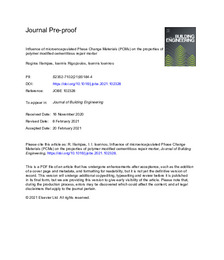Influence of microencapsulated Phase Change Materials (PCMs) on the properties of polymer modified cementitious repair mortar

View/
Date
2021-02-20Source
Journal of Building EngineeringVolume
40Google Scholar check
Keyword(s):
Metadata
Show full item recordAbstract
Microencapsulated Phase Change Materials (PCMs) can be directly incorporated into mortars to enhance their thermal performance. In this study, the addition of a commercial microencapsulated PCM in a polymer modified cement mortar was investigated, aiming at the development of a thermally efficient repair composite that may be used, along with textile reinforcement, for the structural and energy retrofitting of existing building envelopes. The effect of incorporating this PCM into the reference mortar at percentages ranging from 5% to 20% by wt. of solid constituents was thoroughly evaluated by assessing the physico-mechanical and thermal properties of the hardened end-product. Emphasis was placed on specific operational characteristics associated with the intended use of the modified mortar, such as its stress-strain behavior and temperature regulating efficiency. The results show a substantial drop in the mechanical properties of the composite with PCM addition, as well as an increase in its porosity and deformation capacity. In terms of thermal performance, the microencapsulated PCM contributed towards the attenuation and time shifting of temperature peaks. At dosages ≤20% by wt., it was thus possible to obtain mortars with favorable thermal characteristics, without compromising their physico-mechanical behavior to a degree that would preclude repair/strengthening applications.
